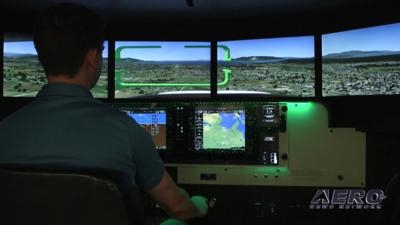Sat, Jun 30, 2018
Rule Goes Into Effect July 27
The FAA has published a rule in the Federal Register laying out new guidelines for the use of "aviation training devices" for flight training.

According to the published rule, use of these training devices has proven to be an effective, safe, and affordable means of obtaining pilot experience. This rulemaking also addresses changing technologies by accommodating the use of technically advanced airplanes as an alternative to the use of older complex single engine airplanes for the commercial pilot training and testing requirements.
Additionally, this rulemaking broadens the opportunities for military instructor pilots or pilot examiners to obtain civilian ratings based on military experience, expands opportunities for logging pilot time, and removes a burden from sport pilot instructors by permitting them to serve as safety pilots. Finally, this rulemaking includes changes to some of the provisions established in an August 2009 final rule.
These actions are necessary to bring the regulations in line with current needs and activities of the general aviation training community and pilots.
This final rule amends the regulations governing the use of aviation training devices (ATDs). As stated in the NPRM, the FAA approves ATDs for use in pilot certification training. Title 14 of the Code of Federal Regulations (14 CFR) part 60 governs the qualification of flight simulation training devices (FSTD), which include full flight simulators (FFSs) levels A through D and flight training devices (FTDs) levels 4 through 7.
Under the final rule, the FAA is:
- Adding a definition of ATD in § 61.1;
- removing the requirement for an instructor to be present when a pilot accomplishes his or her instrument recency in an FFS, FTD, or ATD; and
- amending the regulations to allow pilots to accomplish instrument recency experience in ATDs at the same interval allowed for FFSs and FTDs.
The rule becomes effective July 27, 2018. There are extensive details about the new rules provided at the FMI link below.
(Source: Federal Register. Image from file)
More News
From 2021: The Inside Skinny On What Being An ANN Oshkosh Stringer Is All About By ANN Senior Stringer Extraordinare, Gene Yarbrough The annual gathering at Oshkosh is a right of p>[...]
Video Showed That During The Takeoff, The Nose Baggage Door Was Open On May 10, 2025, about 0935 eastern daylight time, a Piper PA-32RT-300, N30689, was destroyed when it was invol>[...]
Get The Latest in Aviation News NOW on Instagram Are you on Instagram yet? It's been around for a few years, quietly picking up traction mostly thanks to everybody's new obsession >[...]
"I think what is key, we have offered a bonus to air traffic controllers who are eligible to retire. We are going to pay them a 20% bonus on their salary to stay longer. Don't reti>[...]
Aero Linx: Pilot Briefing The gathering, translation, interpretation, and summarization of weather and aeronautical information into a form usable by the pilot or flight supervisor>[...]
 Oshkosh Memories: An Aero-News Stringer Perspective
Oshkosh Memories: An Aero-News Stringer Perspective NTSB Prelim: Piper PA32RT
NTSB Prelim: Piper PA32RT ANN FAQ: Follow Us On Instagram!
ANN FAQ: Follow Us On Instagram! Aero-News: Quote of the Day (05.28.25)
Aero-News: Quote of the Day (05.28.25) ANN's Daily Aero-Term (05.28.25): Pilot Briefing
ANN's Daily Aero-Term (05.28.25): Pilot Briefing



